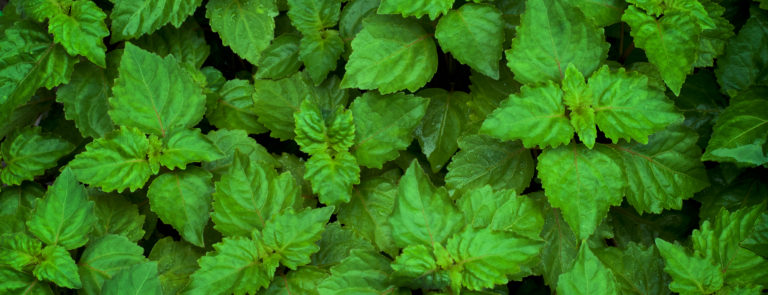15% off €35 OR 20% off €45
Patchouli essential oil: 16 benefits and uses

While wellness trends are always evolving, one thing’s still a given. Most of us are all looking for ways to take care of ourselves in the best possible way, with many of us regularly trying out new self-care activities or reverting back to tried-and-tested remedies.1,2
Essential oils are certainly not a new phenomenon. In fact, it’s thought that the ancient Messapotamians used them as far back as 5000 BC.3
Nevertheless, recent reports suggest there has been an essential oil revival, as more of us look for natural healthcare products and plant-based solutions. 4
One of our most-loved essential oils is patchouli. It’s used to fragrance many of our favourite perfumes, beauty products and cosmetics.
Are you now wondering if it’s worth adding patchouli to your wellness toolbox? Keep reading…
What is patchouli?
Patchouli is a type of aromatic, flowering plant. It’s related to the mint family, and its official name is ‘pogostemon cablin.’
The oil comes from the plant leaves, which are shade-dried and then distilled.5
There are three species of patchouli - Pogostemon Cablin, Pogostemon Heyneanus and Pogostemon Hortensis.
The Cablin species is the most popular and most-commonly cultivated for its essential oil because of its stronger therapeutic properties. 6
Where does the patchouli flower come from?
Patchouli is native to tropical Asia, and is widely cultivated in regions, such as Brazil and Hawaii, and Asian regions, including China, India, Malaysia and Indonesia.7
A shrubby perennial plant, patchouli can grow up to one metre tall and has large, oval-shaped fragrant leaves. Both the stems and the leaves are extremely hairy.
Meanwhile, the flowers are small and pale purple/white in colour. They look like thick woolly spikes and have long stamens.8
What does patchouli smell like?
Patchouli oil has an intense smell, which is often described as strong, sweet, and intoxicating.
It’s quite earthy, which is why it’s often used as a base note in fragrances. It blends well with other essential oils and ingredients, making it ideal for a wide range of products.9
Historically, it was used to scent Indian fabrics, such as fine silks and shawls to get rid of moths and other insects in the 1800s.
As a result, patchouli oil is believed to have been given its name from the Hindi word ‘pacholi’, which means ‘to scent.’ 10
Summary
- Patchouli is a type of aromatic flowering plant that’s part of the mint family
- Patchouli is native to tropical Asia, and is widely cultivated in regions, such as Brazil and Hawaii, and Asian regions, including China, India, Malaysia and Indonesia
- It has an intense smell, which is often described as earthy, strong, sweet and intoxicating
What is patchouli essential oil?
As the name suggests, patchouli essential oil is an oil that’s extracted from the leaves of the patchouli plant, using a process known as steam distillation.11
Due to its musky, non-overpowering scent, it’s widely used in soaps, perfumes, detergents, cosmetics and deodorants.
It’s also used in aromatherapy, and as a common fragrance for incense and candles.
Interestingly, the patchouli plant doesn’t smell of anything; it’s odourless. It’s the distillation process that gives patchouli essential oil its distinctive scent.12
8 patchouli uses
Patchouli oil is used for all sorts of different things.
- In perfumes and fragrances – when combined with a carrier oil, patchouli oil makes a wonderful natural fragrance. And, as mentioned a bit further up, it’s found in all sorts of manufactured scents too.
- Cosmetics – the pleasant, musky scent of patchouli oil means it can be found in abundance in many cosmetic products too. You can also, providing you don’t apply it to your skin neat, make your own for soothing and beautifully-smelling products. For instance, mix five drops of patchouli oil and five drops of frankincense oil together with a cup of argan oil and apply to your face after cleansing. You will instantly feel calmer and your skin will feel smoother.13
- Soaps and detergents – liquid and bar patchouli soaps, washing products and other detergent-type products, all smell fabulous with a drop or two of patchouli oil. Once again, don’t be afraid to make your own versions, but make sure you dilute the patchouli with other complementary oils etc.
- Aromatherapy - patchouli essential oil can be inhaled. Simple sprinkle a few drops of the oil on to a cloth or tissue or use an aromatherapy patchouli diffuser or vaporiser or patchouli incense.14
- Topical application – always apply diluted patchouli to avoid skin irritations and any allergic reactions or medical issues from occurring.
- In baths - when combined with a carrier oil, such as jojoba, sweet almond or avocado, patchouli essential oil can be applied directly to the skin or sprinkled into baths.15
- On your nails – due to its antifungal and antibacterial properties, patchouli oil is great for nail health. Restore brittle, uneven nails by soaking your nails in this solution for at least 15 minutes – four drops of eucalyptus essential oil and four drops of patchouli oil. 16
- On your hands – patchouli can potentially work wonders for cracked skin. Give this healing hand salve a try. Mix all of these ingredients together in a blender and work into your skin for instant nourishment: 17
- 1/16th of a cup of beeswax
- 1/4th of a cup of coconut oil
- 1/4th of a cup of safflower oil
- 1 tablespoon of castor oil
- 1 teaspoon of Vitamin E
- 8 drops of patchouli essential oil
- 5 drops of lavender essential oil
Note – ingesting or consuming patchouli oil can have serious side effects.18
Summary
- There are lots of different uses for patchouli oil
- It can be found far and wide in cosmetic products, soaps, perfumes and fragrances
- It’s also used in aromatherapy and can be applied topically (if diluted first)
Benefits of patchouli
Patchouli oil has been used for centuries and has a range of reported benefits. We’ve listed some of them below:19
-
Patchouli oil and relaxation
A preliminary study published in the Journal of Natural Medicines in 2011 found that patchouli essential oil may help promote relaxation.
In tests on mice, the study found that inhaling the aroma of patchouli essential oil may have soothing effects that could be useful for managing sleep issues.20
-
Patchouli oil and mosquitos
A 2005 Phytotherapy Research report concluded that patchouli essential oil may help protect against mosquito bites by acting as an insect repellent. 21
-
Patchouli oil and insects in general
Some test tube studies have found patchouli oil to be an effective natural pesticide, particularly when it comes to these insects, cigar beetle, rice/maize weevil, flour beetle and formosan subterranean termites.
-
Patchouli and anxiety/stress
One review study suggested patchouli oil may be calming, relaxing and uplifting. The patchouli oil aroma seemed to improve mood when inhaled. Larger trials are yet to be carried out.
Meanwhile, in a separate piece of research involving 43 women, it was concluded fragrances can affect the fight-or-flight response.
When activated, the fight-or-flight response increases blood pressure and heart rate. By inhaling patchouli oil, the women’s flight-or-flight responses reduced by 40%, which had a relaxing effect on them.
-
Patchouli oil and skin health
In a study of 100 people, an essential oil containing 12% patchouli oil, amongst other oils, helped to manage symptoms of skin infections and reduced the healing time of the skin.
However, patchouli oil’s actual impact on the overall results is unknown, as a combination of oils were used at the same time.
-
Patchouli oil and ageing
A study of UV-damaged mice found patchouli oil prevented aging and helped maintain skin integrity.
Meanwhile, separate studies are being conducted to explore whether patchouli oil can scavenge reactive oxidative species (ROS) in cells. If this is the case, it may have antioxidant properties.
-
Patchouli oil and bacteria
Patchouli oil’s antibacterial qualities were put to the test in one research study against 10 other essential oils. It was concluded patchouli oil was the most active against the following types of bacteria:
- Acinetobacter baumannii
- Aeromonas veronii
- Enterococcus faecalis
- E. coli
- H. pylori
- Klebsiella pneumoniae
- Pseudomonas aeruginosa
- Salmonella enteric
- Staphylococcus aureus
-
Patchouli oil and fungal infections
Patchouli oil has been referenced in research as having antifungal properties however, they are yet to be clinically proven.
It may reportedly be effective against Aspergillus Species, which can cause infections, and Candida albicans, which causes yeast infections, nail infections and oral thrush.
It’s worth bearing in mind that natural remedies aren’t always effective and can be harmful if misused.22
Summary
- Just as there are lots of uses, there are lots of benefits associated with patchouli
- It’s believed to have antibacterial and antifungal properties
- Studies have also found it may help induce sleep and ease stress and anxiety
Side effects of patchouli
Patchouli oil is generally thought to be safe for use on the skin or inhaled when diluted.23
Remember, though, never apply pure essential oils directly to your skin without a carrier oil and never consume essential oils. This could cause skin irritation or other serious side effects.24
Patchouli oil can potentially affect blood clotting; therefore you should avoid using it if you:25
- Are taking blood thinning medication
- Have recently had or will be undergoing major surgery
- Have a bleeding disorder, such as hemophilia
Patchouli oil may be toxic if you drink it. As is the case with using all essential oils, pregnant women and children shouldn’t use patchouli oil unless advised to by a medical professional.
Takeaway
Patchouli essential oil is a highly popular oil that’s steeped in history, with so many reported benefits and uses.
There’s patchouli scent, which most of us all know and love, but aside from the fragrance, there’s an additional layer of benefits associated with patchouli oil, some that have been proven many times over, and some that are yet to be proven in humans.
There are plenty of reasons to add some patchouli to your life, whether that’s by enjoying a relaxing patchouli oil hot soak, making it your signature scent or diffusing it in your home.
Now that you’ve read this article, do you like the idea of a patchouli diffuser or vaporiser? This article explores how you can use essential oils, including patchouli, in your home, ‘Finding the best essential oils for your home.’
Last updated: 8 June 2021
- https://www.naturalhealthmagazine.co.uk/Family/2020-trend-report
- https://www.mintel.com/blog/personal-care-market-news/the-evolution-of-self-care
- https://www.encyclopedia.com/science-and-technology/chemistry/organic-chemistry/essential-oils
- https://www.stylist.co.uk/beauty/best-aromatherapy-products-oils-ease-anxiety/246612
- https://www.britannica.com/plant/patchouli
- https://aha.ca/10-health-benefits-of-patchouli-essential-oil/
- https://aha.ca/10-health-benefits-of-patchouli-essential-oil/
- https://www.britannica.com/plant/patchouli
- https://www.byrdie.com/what-is-patchouli-346210
- https://aha.ca/10-health-benefits-of-patchouli-essential-oil/
- https://www.britannica.com/plant/patchouli
- https://www.decleor.co.uk/blogs/patchouli.html
- https://www.bustle.com/articles/62302-these-patchouli-essential-oil-uses-for-healing-dry-skin-and-nails-will-seriously-up-your-winter
- https://www.verywellhealth.com/the-benefits-of-patchouli-essential-oil-88789
- https://www.verywellhealth.com/the-benefits-of-patchouli-essential-oil-88789
- https://www.bustle.com/articles/62302-these-patchouli-essential-oil-uses-for-healing-dry-skin-and-nails-will-seriously-up-your-winter
- https://www.bustle.com/articles/62302-these-patchouli-essential-oil-uses-for-healing-dry-skin-and-nails-will-seriously-up-your-winter
- https://www.poison.org/articles/2014-jun/essential-oils
- https://selfhacked.com/blog/patchouli-oil/
- https://www.verywellhealth.com/the-benefits-of-patchouli-essential-oil-88789
- https://www.verywellhealth.com/the-benefits-of-patchouli-essential-oil-88789
- https://www.nhs.uk/conditions/herbal-medicines/
- https://www.ncbi.nlm.nih.gov/pmc/articles/PMC5435909/
- https://www.takingcharge.csh.umn.edu/how-do-i-choose-and-use-essential-oils
- https://aha.ca/10-health-benefits-of-patchouli-essential-oil/



